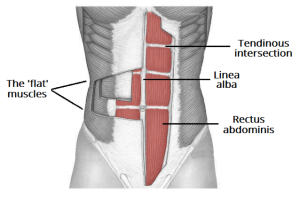
Although postpartum moms are generally cleared for activity after six weeks (longer for cesarean sections), the body has only begun to heal itself and work towards regaining its capacity and strength. Many postpartum moms want what most of us women struggle with in a non-pregnant state: to have their bodies molded to their idea of “good” or “great”.
Postpartum is a time for adjustment, adaptation, and personal growth. It’s also a time fraught with emotional ups and downs and moments of joy and moments of frustration. Top it off with severe sleep deprivation and you have a new mom in search of her new “normal”.
Now more than ever is a ripe time to cultivate body pride and help your new mom personal training clients embrace the beauty of being a mom and working towards optimal health – not weight loss (at least not at this point). It took 9 months to grow, nourish, and deliver new life. It’s going to take at least that long, if not longer, to reshape what was altered to accomplish such an incredible miracle. Offer your patience while offering your expertise and gentle guidance to the new “normal”.

What Postpartum Exercise Shouldn’t Be
Postpartum, because of the delicate nature of the time, breastfeeding needs, muscular imbalances, and the healing midsection, there are some “not necessary to do” guidelines when it comes to exercise. Postpartum exercise shouldn’t:
- be about weight loss (despite many new moms’ desires)
- be rigidly scheduled – it needs to be flexible enough to allow the new mom to bond with her baby and have it fit into her current adjustment period
- be performed at the same level of intensity prior to pregnancy – the body (and the mind) simply aren’t ready for that transition
- cause stress – there’s enough stress going on during this time, no need to keep piling it on
- cause discomfort, pain, or increase postpartum bleeding
- cause excessive caloric expenditure in such a way that it interferes with a new mom’s ability to adequately support breastfeeding
What Postpartum Exercise Should Be
Personally, I love training new moms…because I still consider myself a new mom and because I recall how challenging my own postpartum time felt. Regaining my strength and stamina was, some days, and uphill battle and felt more like the quiet persistence of a dream rather than an attainable reality. But it did happen. Not without considerable patience on my part and many moments of forgiving myself for not being patient. Keep this in mind as you help a new mom gain new ground.
Postpartum exercise should:
- focus on stress relief and mindfulness
- promote a gradual increase in stamina, strength, and endurance
- encourage at-home exercise for mom and baby (postnatal yoga is excellent)
- employ creative techniques to help new moms and families fit in fitness in a crazy schedule
- be mindful of adequate water and fluid intake
- encourage the use of a postpartum sports bra
Muscles to focus on postpartum
Target the muscle imbalances created during pregnancy and as a result of odd posturing while holding a child and while breastfeeding. For example, the lower back is largely unsupported during this time due to weakened abdominal muscles.
Prioritize specific core work to repair muscles of the pelvic floor and abdominal wall. During pregnancy, the abs are placed at a mechanical disadvantage. Think about it – the fibers of the rectus run up and down and in order to accommodate a growing baby, they must stretch outward and to the side sometimes causing a split (or a condition called diastasis recti). This takes time and requires a delicate approach – not full sit-ups and crunches! This will only exaggerate the issue.
Postpartum Fitness and Exercise Plan
Start by talking to your client about her goals and guide (gently) in the direction of gradual progress and not immediate results. Set several short-term and easily achievable goals to begin with and follow them up with long-range goal setting. Keep the focus on the present.
Incorporate the following into a routine:
- Progressive Kegel exercises with abdominal compressions, pelvic tilts, partial sit-ups, etc. The point is to maintain the Kegel contractions and abdominal compressions while performing other movements.
- Progressive abdominal bracing with arm movement and heel slides (one side, then both)
- Body weight resistance exercises with baby. A new mom can do wall squats, lunges, lat rows, modified push-up (with baby lying supine on the mat), bridges, bird dogs, etc. Use your creativity. Mom exercising with baby is perceived by the baby as play and quality time. It’s a win-win for both.
- Light cardio or gentle walking is always appropriate as this level most likely wouldn’t be enough to cause additional fatigue.
- To target the social support aspect, connect new mom clients with other new moms or offer mom and baby group classes. New moms are great support for other new moms.
There’s no perfect formula, set of exercises, or recipe for postpartum fitness routines. Including elements of all the above set a solid foundation for an enjoyable routine that will lead to progress and result in goal achievement. You can play a positive and pivotal role in a new mom’s journey – this is a great responsibility; treat it gently and take it seriously.







